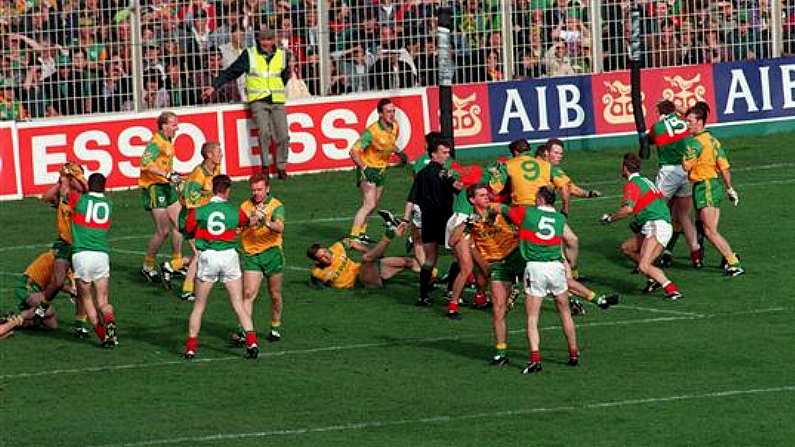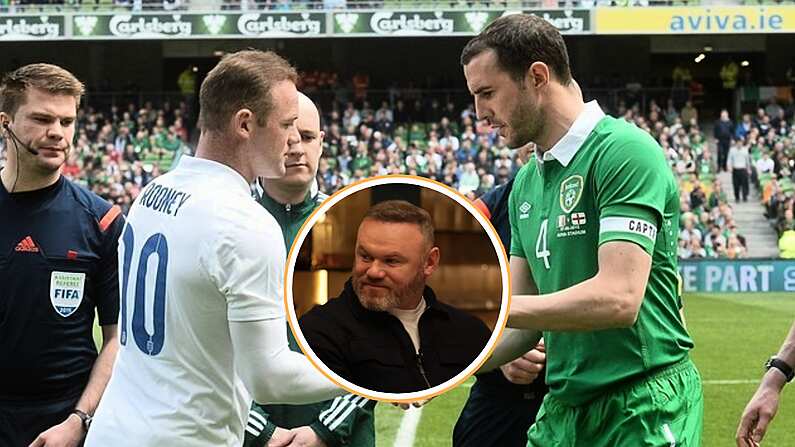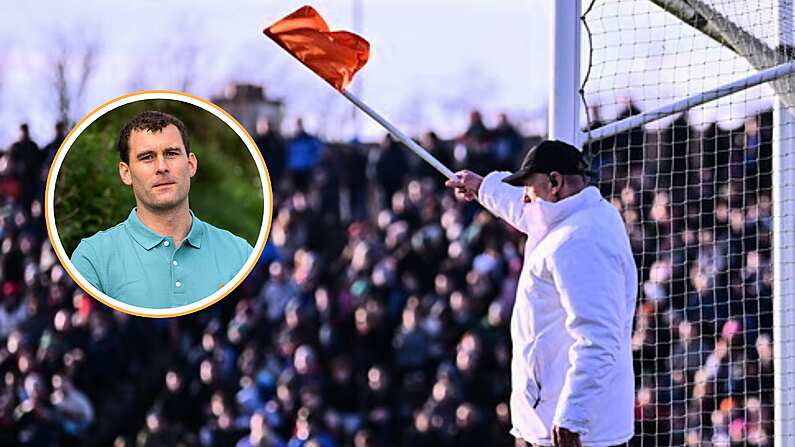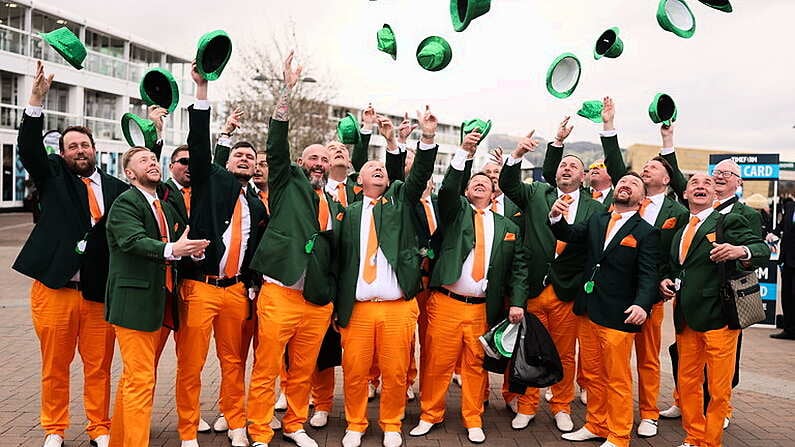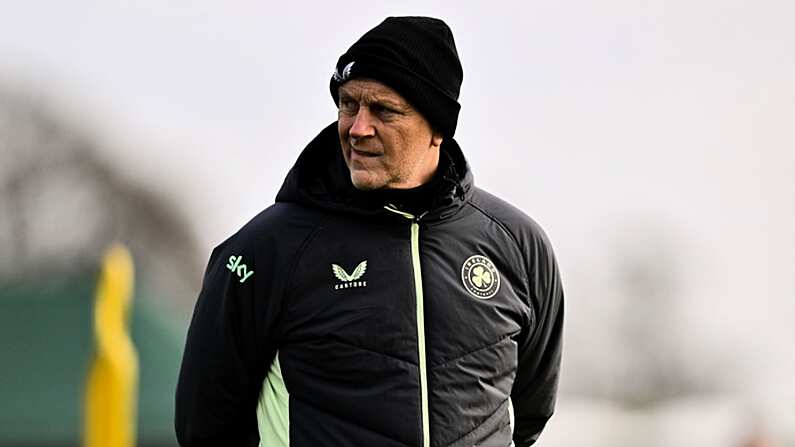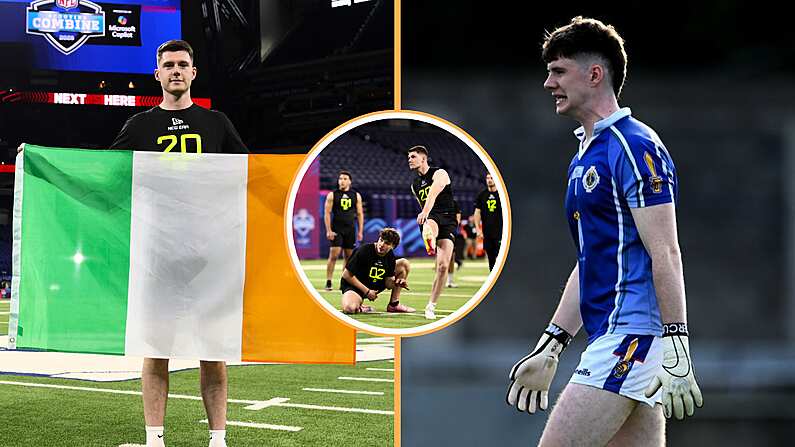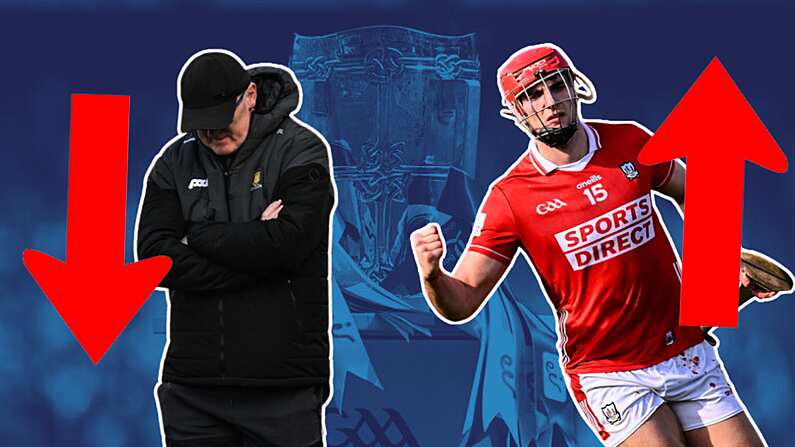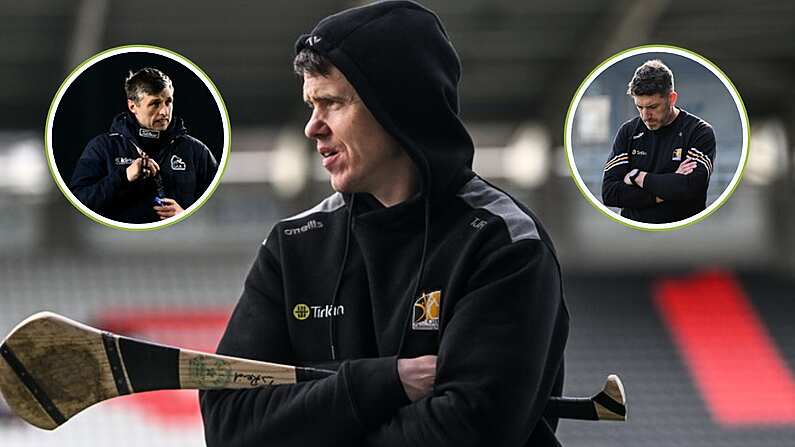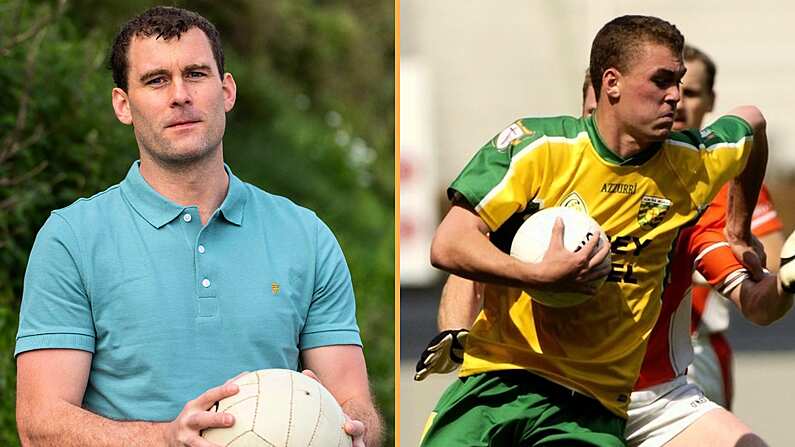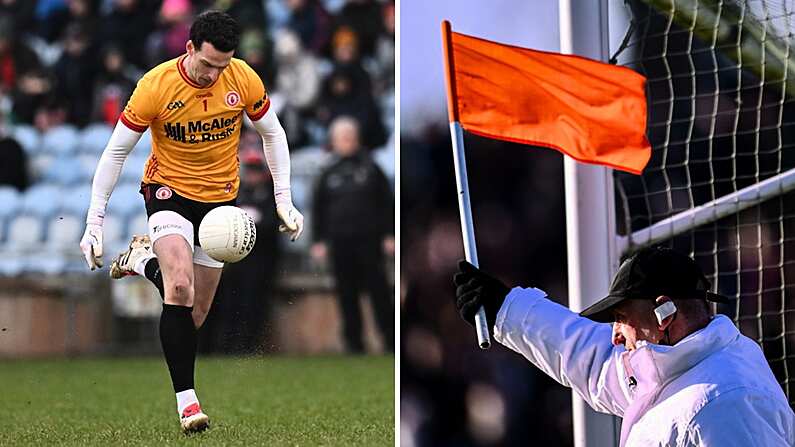For some of us, 1996 doesn't SEEM that long ago. But back then, Mayo had only been waiting a measly 45 years for an All-Ireland. And they'd only lost one All-Ireland final, and that was seven years previous. We never knew the saga that would unfold. On Saturday, they will go into their 9th All-Ireland final since making the '96 decider. They are now 69 years without Sam Maguire.
Given what happened over two days in 24 years ago, maybe we should have known.
*******
In May of 2016, Meath man Sean Fitzsimmons was fined €100 by Westport District Court. He had been blamed for starting a row in a chipper on Castlebar Street.
The Gardaí found him engaged in an altercation with a group of locals. In court, his solicitor Tom Walsh confirmed that the row was started over the 1996 All-Ireland final.
While Fitzsimmons was blamed by the court for instigating the row, we argued at the time that Anthony Finnerty could just as easily have been blamed for kick-starting the whole thing.
Judge Mary Devins chose to fine Fitzsimmons and left it at that. The suspicion remained that had Judge Mary Devins been a man called Pat McEnaney he would have singled out one of the locals and handed him the exact same fine as Mr. Fitzsimmons.
The 1996 All-Ireland final replay is the only match that we know of that has caused fights to break out in chippers nineteen years later. Certainly, it's the only two decade old match to provoke a fight that ended up in court.
It's probably the most famous All-Ireland final of the last twenty-five years. Some All-Ireland finals become part of the folk memory while others fade into historical obscurity, being reduced almost to the status of trivia.
The 1996 All-Ireland final definitely belongs to the first category. It copper-fastened Meath's reputation as Gaelic football's answer to Nick Faldo or Steffi Graf and it was the birth of Mayo's current status as the sport's nearly men. Their reputation in that regard is a far more modern phenomenon than many realise. It's easy to forget now but Mayo were only on a one game losing streak in All-Ireland finals. Their 1989 final appearance was their first since '51.
And in '89, it was Cork, keen to stave off three final defeats in a row, who were the nervous blithering wreck entering the final. Overwhelming underdogs beforehand, Mayo gave them a fright before fading to a late surge.
Mayo had faltered badly following their 1989 All-Ireland final appearance. In 1990, they were surprised by Galway in the Connacht semi-final, a result which underlined their desperate record in Tuam.
After defeat to Roscommon in the 1991 Connacht final, John O'Mahony was swiftly given the boot, a decision which Mayo supporters were to spend the next fifteen years cursing.
They won a couple of piss-poor Connacht championships in 1992 and 1993. The '92 win, as Keith Duggan detailed in House of Pain, was proceeded by a comical display of player disobedience, in which the Mayo team shoved a load of cars around a car park after training one night. The provincial final that year was best remembered for Gay Sheerin pulling down the crossbar.
After that the just retired Jack O'Shea came in as manager. Mayo won the worst Connacht championship of all time in 1993, beating Roscommon on a highly instructive scoreline of 1-5 to 0-7 in Hyde Park. The extent of their battering against Cork in the semi-final presumably made them wish they hadn't. They shipped a historically embarrassing 20-point defeat.
In '94, they were the fall guys in Leitrim's charming feel-good story. Jack O'Shea promptly departed, effectively deciding that a career in management wasn't really for him. In 1995, they were battered by Galway in the Connacht final.
Before the '95 game, a Sunday Sport presenter informed listeners that a Mayo acquaintance said he hoped Mayo would lose so they'd avoid the Ulster champions in the semi-final.
To outsiders at least, things looks unusually unpromising for Mayo at the beginning of 1996. They started the year in Division 3. Anthony Finnerty - recently recalled for one last hurrah - remembers Mayo slumming it among the minnows that winter.
At the start of the year, we were operating in Division 3 of the National League, so that was about as low as Mayo had ever gone. We were after being thrashed in the Connacht final the year before by Galway. So, that's basically where we were. We were playing Fermanagh, Wexford, counties like that in Division 3.
Anthony Egan drifted away after a nothing year in '95 and John Maughan came in as manager. A former Connacht title winner as a player, whose career was cut short by injury, Maughan already had one historic achievement under his belt during his time in exile. He turned the world upside down in Munster by winning a provincial title with Clare in 1992.
On closer inspection, there were green shoots even if few were shining much of a spotlight on them. There was a glut of young players coming on stream. They'd competed in two successive U21 All-Ireland finals, losing to Cork in 1994 and Kerry after in 1995. Players like David Brady, John Casey and James Nallen ascended to the senior ranks.
In addition to the young bucks, Maughan recalled the 35-year old Finnerty to the panel, an ex-teammate of his who'd left the panel in 1993. Finnerty already had five/six Connacht medals and was thought to be past even the twilight of his inter-county career. He scored a massive goal in the second half of the 1989 final, which put Mayo ahead for the first time.
John Maughan brought back two or three players who were off the panel because he felt he had a very young team. We hadn't been involved in 94 and 95. We finished in '93. So, I came back in '96. He wanted a few of us to come back to add a little bit of experience. I just came back for the one year. That was it.
Their form in the League was decent. It encompassed a quarter-final win against Meath.
We got out of Division 3. We won a quarter-final in Roscommon versus Meath and ended up in a League semi-final against Derry. Now we were pretty much beaten comprehensively by Derry at the end of that game. But at the same time, there were signs we might do something.
It was a Ruislip year for Mayo. Fifteen years later, Mayo would flirt with humiliation in London, needing a late equaliser to force extra-time, after which they kicked on and won. James Horan sat in the marquee afterwards, grey with shock, trying to get his head around what had just happened.
1996 wasn't near as harrowing but it was still underwhelming. They ended up limping home by six points. Mike Finnerty commentated on the game for Mid-West Radio.
Mayo stuttered and stumbled and never really got going. And Maurice Sheridan, I'll always remember, gave an exhibition of free-taking. Maurice had just broken into the Mayo team that year and he was still a very raw senior inter-county footballer in a lot of ways but he was a super free-taker. And I remember he got Mayo out of jail that day. And while it wasn't as close as 2011, there still were periods in that game when Mayo were on the rack.
There would be a parallel between the '96 and 2011 in that Mayo were coming off a very poor previous summer. And I do think that was something that James Horan referred to in 2011.
They navigated the challenge of Roscommon in the Connacht semi-final. Liam McHale clipped over a couple of late points to seal a four point win. The world didn't pay too much heed. Roscommon and Mayo met in the championship more or less every year and Mayo's win in '96 didn't feel any different to previous successes.
It was only in the Connacht final that Mayo announced their potential.
Galway, in their characteristic 0-60mph fashion, had gone from underachieving irrelevance to All-Ireland contenders in one season. As in 2016, they bridged an eight year gap to their last Connacht title in the boiling hot summer of 1995. Not only did they demolish Mayo in Tuam, they ended years of western humiliation in Croker that August by giving the Ulster champions Tyrone a proper fright. They were suddenly being talked of as All-Ireland contenders again, talk encouraged by their manager Bosco McDermott.
They entered the game as understandable favourites and the only really known quantity. Mayo started like a train with John Casey rocketing in an early goal. While Galway pegged them back, enjoying a dominant spell early in the second half, Mayo kept on hitting goals at crucial moments. Ray Dempsey blasted home from close range late on to secure a 3-9 to 1-11 win.
There wasn't really any expectations going into the Connacht final. I think we surprised everyone with that win... There was a bit of quality about that. Galway were the big cheese in Connacht. They had done very well the previous year. They had been very impressive in Connacht and had competed well in the All-Ireland semi-final, and were talking about winning an All-Ireland at the time.
They really set themselves up. We felt, lookit, the Connacht final was going to be in Castlebar and we were ready for that, we really targeted that.
Coming from a previous generation, I could see that the athleticism we had. It was a different ball game. I could see that these were serious athletes. The new lads that were in there. There was serious potential in the team. David Brady had come into midfield along with Liam McHale. Kevin Cahill at full back. Kenneth Mortimer was a two-time All-Star in those years. James Horan was excellent at right half forward. John Casey had a super year in '96. Maurice Sheridan was expert free-taker as well. We ticked a lot of the boxes
In Paidí O'Sé's first season as manager, Kerry won back the Munster title - their first in five years - against an ageing Cork team. The aura hadn't yet returned, however. It was far from the most intimidating Kerry team to land in Croke Park. Still, history dictated that they would be favourites. Lazy pundits were quick to back that up.
It was 23 years since the Connacht champions had beaten anyone other than the Ulster champions in an All-Ireland semi-finals, and in recent years they had stopped even doing that.
That famine ended that day. James Horan's surreal goal put the tin hat on it.
Kerry were at a low ebb by their standards. Paidí had come in and they were just building again at that stage.
But John Casey was flying that day, James Horan, who ended up being an All-Star that year, Kenneth Mortimer, an excellent corner back. James Nallen was just coming into his stride. We still had Liam McHale, we had Dermot Flanagan at corner back. We had some good players around the pitch and that semi-final went very, very well for us. They probably underestimated Mayo.
The final(s) are still a source of bitterness, angst and chip shop scuffles to this day. John Maughan told Keith Duggan that he thinks about it pretty much every day.
Pat McEnaney's commonsensical policy of giving one player from each side the line in the event of a brawl seemed at least semi-reasonable beforehand. Unfortunately, he singled out a Mayo midfielder who'd won Man of the Match the first day and a Meath wing-back who'd gotten a chasing in the drawn match and was perceived as a weak-link.
Mayo have lost eight All-Ireland finals since 1989. It's arguable that they entered none of them as favourites.
In '89, they were green outsiders taking on a team who were overdue an All-Ireland themselves. In '97, they never showed and were flattered to only lose by three points.
In '04 and '06, they were trounced by a plainly superior team. In '12, Donegal were just that bit ahead of them, more sure of themselves, more practised in their system, more of a machine.
2013, and particularly '16 and '17 rival '96 in the heartbreaking stakes, but it was in more hope than expectation that Mayo fans went against the Dublin juggernaut.
1996 is the one final that they unarguably frittered away. Not because they were huge favourites beforehand - the two sides were pretty even. More because, they were six points ahead midway through the second half. In a game as low scoring as the drawn 1996 final, six points was a substantial lead. Without even rustling up a goal, Meath reeled them in. While Meath had a reputation for chasing down leads, Finnerty points out that this was a largely new Meath team. Most of the late 80s legends had slipped away. Only Martin O'Connell and Coyler were still there.
We were six points ahead midway through the second half and didn't close it out. This was a very new Meath team and I know they went on to win the All-Ireland in '99. But at the same time, they were like ourselves, they were building. We felt all along we were equal to them, we had beaten them in the League quarter-final. So, we felt going into that game, 'okay, there's going to be nothing between the two teams'. But we obviously had a great chance of winning that All-Ireland. But it was just another of those All-Irelands that got away from us.
The replay hardly needs going over. Pat Spillane has already performed as forensic an analysis as anyone can hope achieve. Few All-Ireland losses have ever been as hard to stomach.
For the players that played in it, it's a sore one. From the ones I was involved in, it was the worst. There's no good and bad All-Irelands that you can lose but that one I felt that we had it in us to win that All-Ireland.
I don't like to be dwelling or looking back. It's just a feeling that we played the best football over the two days and ended up losing. And the way things happened the second day, there was a bit of a scrap and we lost Liam McHale, they lost Colm Coyle. Everything about the thing was upsetting, you know.

